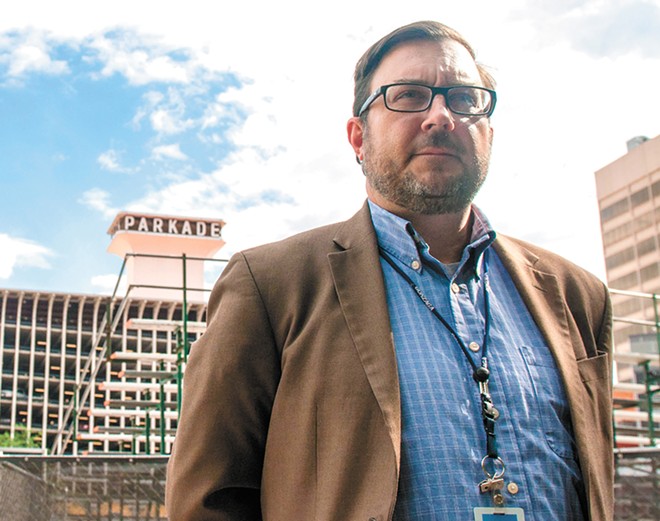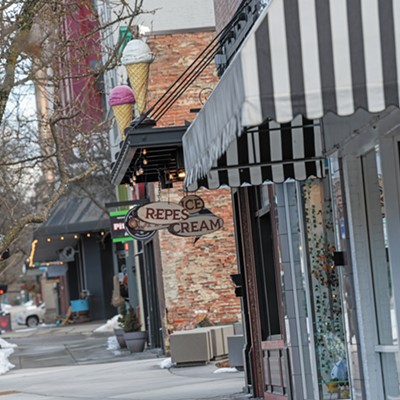If you're running for mayor in Spokane, there are a couple basic rules. Knock on a lot of doors. Raise a lot of money. And don't piss off neighborhoods.
Spokane mayoral elections have been lost because neighbors had been incensed over relatively minor flare-ups involving garbage pickups in alleyways or street trees being torn out.
But Ben Stuckart?
When Stuckart, the city council president, officially announced his run for mayor back in April, he specifically took a few moments to launch salvos against a particularly active type of neighbor: not-in-my-backyarders.
"People say to me that they don't want apartments near them," Stuckart said at his mayoral announcement. "What they're saying is, when we get down to it, 'We don't want poor people next to us.'"
He even did an impression of an email he got from an indignant neighbor, who objected to development changes because they didn't "want flat roofs in our community.'
"I just was, like, 'waaaaah?!'" Stuckart said. "We need density in our community!"
In the months since then, Stuckart has doubled down on that vision.
He passed an ordinance last week that would allow residential developers to build apartments in some dense areas of the city without any parking lots at all. He's championed a controversial plan to loosen the height restrictions on high-rises across from Riverfront Park. And despite neighborhood opposition, Stuckart has remained a supporter of both a proposed development of 25 acres of vacant woods on the South Hill and a controversial plan to send Crestline Street punching through to Southeast Boulevard.
Because now more than ever, Stuckart has become an urbanist — a supporter of denser development, fewer surface parking lots and taller buildings. And, at times, that's a risky spot for a politician to be in.
STUCKART'S GROWTH
Back in 2011, when Stuckart was first running for Spokane City Council president, he acknowledges he probably wouldn't have been championing taller buildings facing Riverfront Park.
"It took me a little growing to get there," Stuckart says.
But the seeds were planted in the early days as a politician, when Italia Trattoria — a high-end restaurant in Browne's Addition — found itself blocked from turning its parking lot into a patio because of city regulations.
That led to discussions with then-City Planning Director Scott Chesney, who called for a Spokane with a taller skyline, a denser downtown and more tightly packed housing.
"Cities have to grow or they die," Chesney insisted.
Stuckart started reading books like The Geography of Nowhere and The High Cost of Free Parking, a massive manifesto by urban planning researcher Donald Shoup that argues minimum parking requirements "force-feed" cities with parking lots that "act like a fertility drug for cars."
"Like alcohol prohibition in the 1920s, minimum parking requirements do more harm than good and should be repealed," Shoup writes.
And Stuckart says he's been persuaded that this is the way forward. If developers believe that parking spaces are necessary for a successful project, they'll build them anyway, he argues — there's usually no need for the government to artificially mandate them.
"I generally agree with getting rid of parking minimums," Stuckart says, though, he acknowledges "it will take a long time for the community to get there."
Yes, Stuckart's political career has been backed by Democrats and the left, where he says, there's "a knee-jerk reaction that developers are bad."
But in office, he says, he's met a lot of developers. And when you work alongside developers on projects, he says, you see that they love Spokane, too.
"I think you stop demonizing people so much," Stuckart says about his experience. "And then that allows you to have an open mind about how to solve a problem. Which then can cause you political problems."
LET THERE BE HEIGHT
And lately, the biggest political problems focus on the proposal to ease height restrictions across from Riverfront Park, in order to set the stage for residential housing in a prime location.
Stuckart says he was surprised by the intensity of the backlash. Some worry about the prospect that the south bank of the park would be covered in shadow during the colder months. "It's a no-win politically at this point," Stuckart says.
Even when he escaped to his cabin on Twin Lakes, Idaho, last week, he says, he got harangued by a close friend over the height-restriction debate.
At other times, the banter was a little less friendly. Former County Commissioner John Roskelley, who served on the state's anti-sprawl Growth Management Hearings Board, suggested on Facebook that Stuckart was betraying his future children.
"In 20 years, will your offspring stand in the park in the shade of some apartment complex and say, 'Who the hell allowed this?'" Roskelley wrote on Facebook. "And someone will say, 'Your dad, that's who.' Think long term."
"John," Stuckart countered. "I do not want to be standing in the park in 20 years and be asked why there is still a parking lot there."
This is an area that defies the typical 6-1 liberal-conservative divide on the City Council.
Councilwoman Lori Kinnear, who represents the downtown and South Hill regions, has often been a more skeptical counterweight to Stuckart's urbanist idealism. She's raised concerns about the lack of parking in Browne's Addition. And she says that her constituents do not want unlimited height on the properties near Riverfront Park.
"There aren't too many saying, 'Yes, sky's the limit,' literally," Kinnear said last month.
"I don't even think we have the votes to change this on council right now," Stuckart says. "There's not going to be a clean, easy vote on this one."
Right now, the city's Plan Commission is re-examining the details of its height-restriction recommendation.
Stuckart says he's willing to compromise in order to spur development, perhaps by settling for a more modest height-limit increase. As strong as Stuckart's urbanist ideology is, he's been more than willing to settle for a smaller win if he feels it pushes the city toward the right direction.
Initially, his proposal to remove parking minimums for buildings that qualify for the city's multi-family tax exemptions sparked skepticism from council members like Kinnear and Candace Mumm.
So Stuckart agreed to pare the proposal back, restricting it to just buildings in the city's designated high-density "centers and corridors." That took the lower South Hill, in Kinnear's district, off the table. The ordinance passed last week unanimously.
In the meantime, Kinnear says that she's watched the entire council gradually move toward a more urbanist vision. She says they've seen what sprawl has meant for communities like Yakima and the Tri-Cities. They grasped how expensive it can be in the long term.
"I think we're educating each other," Kinnear says.
THE DESTINY OF DENSITY
Walking through downtown Spokane, Stuckart sees a lot that he'd like to change.
He wants to see more protected bike lanes, despite worries they'd be difficult to plow. He wants to see more covered multi-story parking garages downtown instead of surface parking spaces. He knows people are still haunted by the River Park Square Parking garage debacle in the late '90s — the public/private-partnership-turned-fiasco the city is still paying for. But he says people need to get over it. In the long run, the parking garage helped downtown.
Most of all, he wants to see a lot more people living downtown. Stuckart's argument for more city-wide density is economic: We can't grow city tax revenue — or attract major companies — without more space to put more people, he argues.
It's also philanthropic: We need 11,000 more affordable housing units in the next four years, Stuckart proclaimed at a homelessness forum.
But for Stuckart, it even goes deeper than that. It's psychological and sociological. Stuckart argues it's a way to counter President Donald Trump's ideology of division and separation. Ultimately, he says, putting more people together — mixing the rich and the poor — breaks down barriers.
Yes, he knows that angering neighborhoods could hurt his political ambitions. "I could easily lose a mayor's race based on [building] heights on Spokane Falls Boulevard," Stuckart says.
He remembers how Dennis Hession may have lost his mayoral race a decade ago for suspending garbage pickups in alleys.
But when Stuckart brought that up during his council president debate with Hession back in 2011, Hession insisted he didn't regret it.
"He goes, 'No! It was the right thing to do,'" Stuckart says. "I think raising these [height limits] and getting more housing is the right thing to do." ♦




























